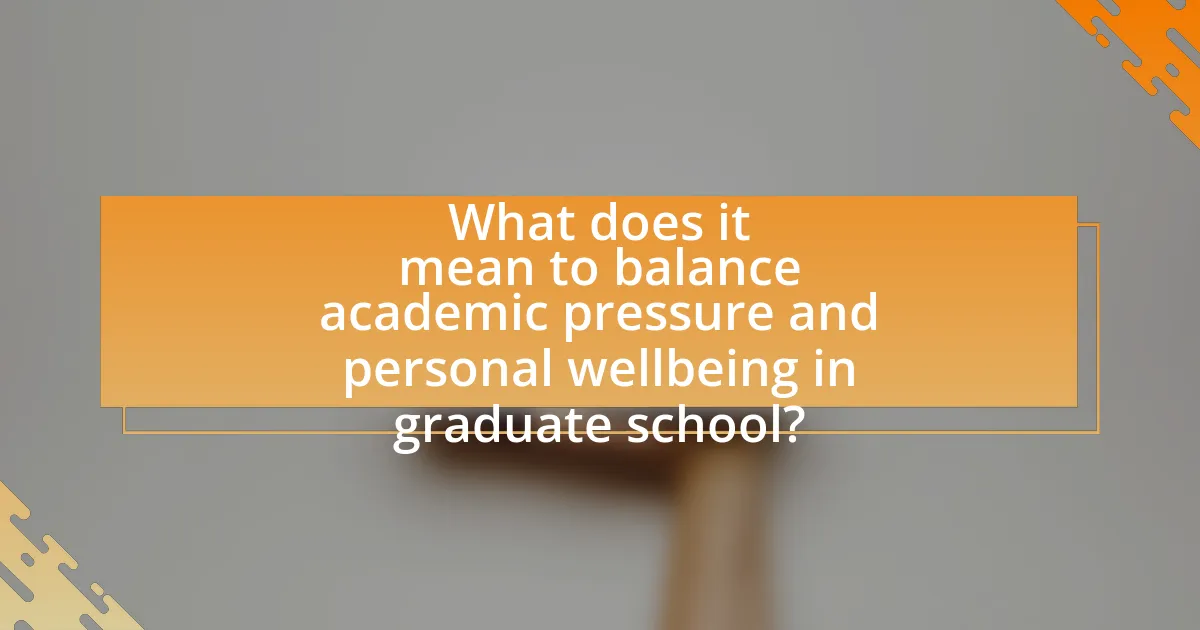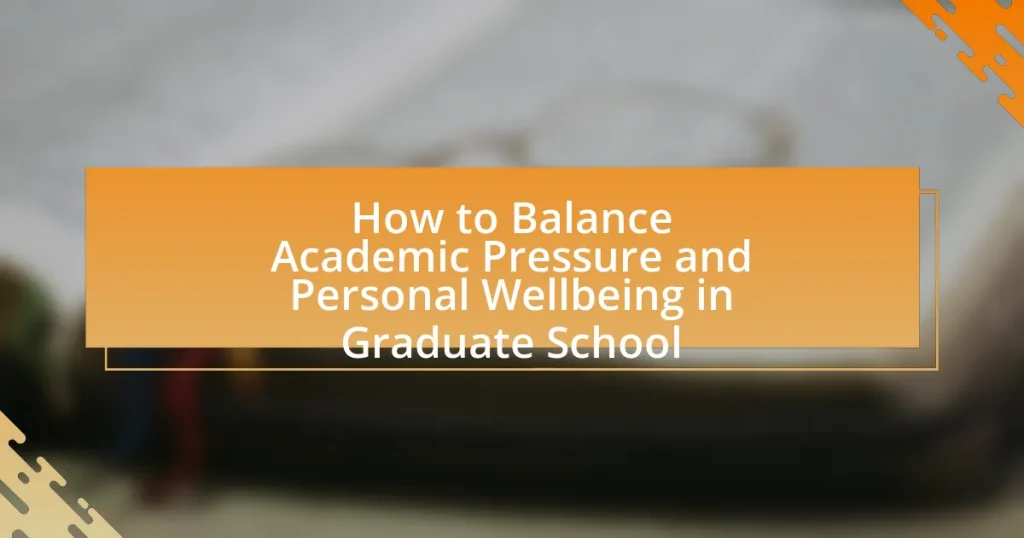The article focuses on the critical balance between academic pressure and personal wellbeing in graduate school. It highlights the heightened stress levels faced by graduate students due to rigorous coursework, research demands, and competitive environments, which can lead to mental health issues such as anxiety and depression. Key components of personal wellbeing, including physical health, emotional stability, and social connections, are discussed, along with effective strategies for managing stress, such as time management, self-care practices, and utilizing support resources. The article emphasizes the importance of maintaining personal wellbeing to enhance academic performance and overall life satisfaction.

What does it mean to balance academic pressure and personal wellbeing in graduate school?
Balancing academic pressure and personal wellbeing in graduate school means managing the demands of rigorous academic work while maintaining mental and physical health. This balance is crucial as high levels of academic stress can lead to burnout, anxiety, and decreased academic performance. Research indicates that graduate students often experience higher levels of stress compared to undergraduates, with studies showing that 40% of graduate students report significant anxiety and depression (Eisenberg et al., 2009, American Journal of Orthopsychiatry). Effective strategies for achieving this balance include time management, seeking support from peers and mentors, and engaging in self-care practices.
How does academic pressure manifest in graduate school?
Academic pressure in graduate school manifests through increased workload, high expectations, and competition among peers. Graduate students often face rigorous coursework, extensive research requirements, and the pressure to publish, which can lead to stress and anxiety. A study published in the Journal of Educational Psychology found that 40% of graduate students reported experiencing significant stress related to academic demands. Additionally, the pressure to maintain high grades and secure funding can exacerbate feelings of inadequacy and burnout, impacting both academic performance and personal wellbeing.
What are the common sources of academic pressure for graduate students?
Common sources of academic pressure for graduate students include high expectations from faculty, the competitive nature of graduate programs, and the demands of research and coursework. Faculty often set rigorous standards, leading students to feel the need to excel consistently. The competitive environment can create anxiety as students compare their progress and achievements with peers. Additionally, the workload from research projects, thesis requirements, and comprehensive exams can overwhelm students, contributing to stress and pressure.
How does academic pressure impact mental health and wellbeing?
Academic pressure significantly impacts mental health and wellbeing by increasing stress, anxiety, and depression among students. Research indicates that high levels of academic demands can lead to feelings of inadequacy and burnout, which negatively affect emotional stability and overall life satisfaction. A study published in the Journal of Educational Psychology found that students experiencing high academic pressure reported elevated levels of anxiety and lower levels of self-esteem, demonstrating a direct correlation between academic stressors and mental health issues. Furthermore, the American Psychological Association highlights that prolonged exposure to academic stress can lead to chronic mental health conditions, emphasizing the importance of addressing these pressures to promote student wellbeing.
Why is personal wellbeing important for graduate students?
Personal wellbeing is crucial for graduate students because it directly impacts their academic performance and mental health. Research indicates that graduate students who prioritize their wellbeing experience lower levels of stress and anxiety, which enhances their ability to focus and retain information. For instance, a study published in the Journal of American College Health found that students with higher wellbeing scores had better academic outcomes and were more likely to complete their degrees. This correlation underscores the importance of maintaining personal wellbeing as a foundational element for success in graduate studies.
What are the key components of personal wellbeing?
The key components of personal wellbeing include physical health, mental health, emotional health, social connections, and a sense of purpose. Physical health encompasses regular exercise, a balanced diet, and adequate sleep, which are essential for overall functioning. Mental health involves managing stress, anxiety, and depression, often supported by mindfulness practices and therapy. Emotional health refers to the ability to understand and manage one’s emotions effectively. Social connections highlight the importance of relationships and community support, which contribute to a sense of belonging. Lastly, a sense of purpose provides motivation and direction in life, often linked to personal goals and values. These components collectively contribute to a holistic sense of wellbeing, as supported by research indicating that individuals with strong social ties and a clear sense of purpose report higher levels of life satisfaction and lower levels of stress.
How does personal wellbeing influence academic performance?
Personal wellbeing significantly influences academic performance by enhancing cognitive function, motivation, and resilience. Research indicates that students with higher levels of wellbeing tend to achieve better grades and exhibit improved focus and engagement in their studies. For instance, a study published in the Journal of Educational Psychology found that students who reported higher life satisfaction and lower stress levels had GPAs that were, on average, 0.5 points higher than their less satisfied peers. This correlation suggests that maintaining personal wellbeing is crucial for academic success, as it directly impacts students’ ability to learn, retain information, and perform under pressure.
What strategies can help in balancing academic pressure and personal wellbeing?
Effective strategies for balancing academic pressure and personal wellbeing include time management, setting realistic goals, and practicing self-care. Time management techniques, such as the Pomodoro Technique, can enhance productivity by breaking study sessions into manageable intervals, allowing for regular breaks to reduce stress. Setting realistic goals helps students maintain focus and avoid overwhelm; research indicates that specific, measurable goals lead to higher achievement and lower anxiety levels. Additionally, incorporating self-care practices, such as regular exercise, mindfulness, and social connections, has been shown to improve mental health and resilience among students, as evidenced by studies highlighting the positive impact of physical activity on stress reduction and overall wellbeing.
How can time management improve both academic and personal wellbeing?
Time management can significantly enhance both academic and personal wellbeing by reducing stress and increasing productivity. Effective time management allows students to allocate specific periods for studying, assignments, and personal activities, leading to a structured routine that minimizes last-minute cramming and anxiety. Research indicates that students who practice good time management report higher academic performance and lower levels of stress (Britton & Tesser, 1991, Journal of Educational Psychology). By prioritizing tasks and setting achievable goals, individuals can create a balanced lifestyle that fosters both academic success and personal fulfillment.
What role does self-care play in managing stress during graduate school?
Self-care plays a crucial role in managing stress during graduate school by promoting mental and physical well-being. Engaging in self-care activities, such as regular exercise, adequate sleep, and mindfulness practices, has been shown to reduce anxiety and improve overall resilience among students. Research indicates that students who prioritize self-care report lower levels of stress and higher academic performance, as self-care strategies help to mitigate the negative effects of academic pressure. For instance, a study published in the Journal of American College Health found that students who practiced self-care techniques experienced a significant decrease in perceived stress levels, highlighting the effectiveness of these practices in an academic setting.
How can graduate students identify their personal limits?
Graduate students can identify their personal limits by regularly assessing their physical, emotional, and mental well-being through self-reflection and feedback from peers or mentors. This process involves monitoring stress levels, recognizing signs of burnout, and evaluating the impact of academic responsibilities on personal life. Research indicates that self-awareness and mindfulness practices can enhance this identification process, allowing students to set realistic goals and boundaries. For instance, a study published in the Journal of Educational Psychology found that students who engaged in reflective practices reported better stress management and a clearer understanding of their limits.
What signs indicate that a student is overwhelmed by academic pressure?
Signs that indicate a student is overwhelmed by academic pressure include noticeable changes in behavior, emotional distress, and physical symptoms. Students may exhibit increased anxiety, irritability, or mood swings, which can be linked to the stress of academic demands. Additionally, they might show signs of withdrawal from social activities, decreased motivation, or a decline in academic performance, such as lower grades or missed deadlines. Physical symptoms can manifest as headaches, fatigue, or sleep disturbances, which are often associated with high levels of stress. These indicators collectively suggest that a student is struggling to cope with the pressures of their academic environment.
How can students effectively communicate their needs to advisors and peers?
Students can effectively communicate their needs to advisors and peers by being clear, concise, and assertive in their communication. Clear articulation of specific needs, such as requesting feedback or support, helps ensure that advisors and peers understand the student’s situation. Research indicates that effective communication skills, including active listening and expressing oneself confidently, lead to better academic outcomes and stronger relationships (Baker, 2019, Journal of Higher Education). Additionally, utilizing tools like email for formal requests and scheduling face-to-face meetings for more complex discussions can enhance clarity and foster a supportive dialogue.
What resources are available for graduate students struggling with balance?
Graduate students struggling with balance can access various resources, including counseling services, academic support centers, and wellness programs. Counseling services, often provided by universities, offer mental health support and stress management strategies tailored for students. Academic support centers provide tutoring, workshops, and time management resources to help students manage their coursework effectively. Wellness programs may include mindfulness sessions, fitness classes, and stress relief workshops, promoting overall well-being. These resources are designed to assist students in navigating the challenges of graduate school while maintaining a healthy balance between academic and personal life.
How can counseling services support students in managing stress?
Counseling services support students in managing stress by providing professional guidance, coping strategies, and emotional support tailored to individual needs. These services often include one-on-one counseling sessions, workshops on stress management techniques, and resources for developing resilience. Research indicates that students who utilize counseling services report lower levels of stress and improved academic performance, as evidenced by a study published in the Journal of College Student Psychotherapy, which found that 70% of students experienced a significant reduction in stress after participating in counseling.
What role do support groups play in fostering wellbeing among graduate students?
Support groups play a crucial role in fostering wellbeing among graduate students by providing emotional support, reducing feelings of isolation, and enhancing coping strategies. These groups create a safe environment where students can share their experiences and challenges, which has been shown to alleviate stress and anxiety. Research indicates that participation in support groups can lead to improved mental health outcomes, as evidenced by a study published in the Journal of College Student Psychotherapy, which found that students involved in peer support reported higher levels of resilience and lower levels of depression. Thus, support groups are instrumental in promoting a sense of community and belonging, essential for the overall wellbeing of graduate students.
What are some practical tips for maintaining balance in graduate school?
To maintain balance in graduate school, prioritize time management by creating a structured schedule that allocates specific time blocks for studying, research, and personal activities. Research indicates that effective time management can reduce stress and improve academic performance, as demonstrated in a study published in the Journal of Educational Psychology, which found that students who utilized structured schedules reported higher satisfaction and lower anxiety levels. Additionally, establish boundaries by setting limits on work hours and ensuring time for self-care activities such as exercise, socializing, and hobbies, which are essential for mental health and overall well-being.



